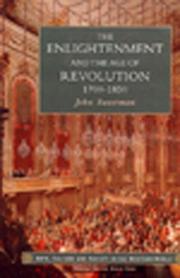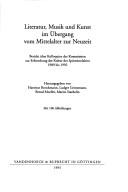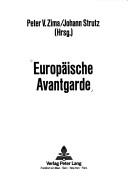| Listing 1 - 10 of 64 | << page >> |
Sort by
|

ISBN: 9783825352905 Year: 2007 Volume: 137 Publisher: Heidelberg Universitätsverlag Winter
Abstract | Keywords | Export | Availability | Bookmark
 Loading...
Loading...Choose an application
- Reference Manager
- EndNote
- RefWorks (Direct export to RefWorks)
Arts, European --- Time in art --- Time in literature --- European arts
Book
ISBN: 0300035616 Year: 1986 Publisher: New Haven (Conn.): Yale university
Abstract | Keywords | Export | Availability | Bookmark
 Loading...
Loading...Choose an application
- Reference Manager
- EndNote
- RefWorks (Direct export to RefWorks)
Arts, European --- Metamorphosis in art --- European arts --- Arts, European. --- Metamorphosis in art. --- Art européen --- Kunst (Europese).

ISBN: 0582084903 0582084911 9780582084919 9780582084902 Year: 1998 Publisher: New York (N.Y.): Longman
Abstract | Keywords | Export | Availability | Bookmark
 Loading...
Loading...Choose an application
- Reference Manager
- EndNote
- RefWorks (Direct export to RefWorks)
Arts, European --- -Arts, European --- -European arts --- Arts, European - 18th century --- Arts, European - 19th century --- -Arts, European -
Book
Abstract | Keywords | Export | Availability | Bookmark
 Loading...
Loading...Choose an application
- Reference Manager
- EndNote
- RefWorks (Direct export to RefWorks)
Arts, European. --- Echo (Greek mythology) --- Narcissus (Greek mythology) --- Arts, European --- Mythology, Greek --- European arts
Book
ISBN: 0801460972 0801450233 1322505365 Year: 2011 Publisher: Ithaca, N.Y. : Cornell University Press : Cornell University Library,
Abstract | Keywords | Export | Availability | Bookmark
 Loading...
Loading...Choose an application
- Reference Manager
- EndNote
- RefWorks (Direct export to RefWorks)
In this groundbreaking book, David Roberts sets out to demonstrate the centrality of the total work of art to European modernism since the French Revolution. The total work of art is usually understood as the intention to reunite the arts into the one integrated whole, but it is also tied from the beginning to the desire to recover and renew the public function of art. The synthesis of the arts in the service of social and cultural regeneration was a particularly German dream, which made Wagner and Nietzsche the other center of aesthetic modernism alongside Baudelaire and Mallarmé. The history and theory of the total work of art pose a whole series of questions not only to aesthetic modernism and its utopias but also to the whole epoch from the French Revolution to the totalitarian revolutions of the twentieth century. The total work of art indicates the need to revisit key assumptions of modernism, such as the foregrounding of the autonomy and separation of the arts at the expense of the countertendencies to the reunion of the arts, and cuts across the neat equation of avant-gardism with progress and deconstructs the familiar left-right divide between revolution and reaction, the modern and the antimodern. Situated at the interface between art, religion, and politics, the total work of art invites us to rethink the relationship between art and religion and art and politics in European modernism. In a major departure from the existing literature David Roberts argues for twin lineages of the total work, a French revolutionary and a German aesthetic, which interrelate across the whole epoch of European modernism, culminating in the aesthetic and political radicalism of the avant-garde movements in response to the crisis of autonomous art and the accelerating political crisis of European societies from the 1890's forward.
Modernism (Aesthetics) --- Arts, Modern --- Arts, European --- European arts --- Modern arts --- Philosophy. --- Aesthetics

ISBN: 3525825951 9783525825952 Year: 1995 Volume: 208 Publisher: Göttingen Vandenhoeck und Ruprecht
Abstract | Keywords | Export | Availability | Bookmark
 Loading...
Loading...Choose an application
- Reference Manager
- EndNote
- RefWorks (Direct export to RefWorks)
Arts, European --- Congresses. --- 930.85.42 --- -European arts --- Cultuurgeschiedenis: Middeleeuwen --- Congresses --- -Cultuurgeschiedenis: Middeleeuwen --- 930.85.42 Cultuurgeschiedenis: Middeleeuwen --- -930.85.42 Cultuurgeschiedenis: Middeleeuwen --- European arts --- Arts, European - Congresses. --- Vie intellectuelle --- Humanisme --- 14e-16e siecles --- Allemagne

ISBN: 3820400575 9783820400571 Year: 1987 Publisher: Frankfurt am Main Lang
Abstract | Keywords | Export | Availability | Bookmark
 Loading...
Loading...Choose an application
- Reference Manager
- EndNote
- RefWorks (Direct export to RefWorks)
Acant-garde (Aesthetics) --- -Arts, European --- -European arts --- History --- Avant-garde (Aesthetics) --- -History --- -Acant-garde (Aesthetics) --- Arts, European --- Aesthetics --- Modernism (Art)
Periodical
ISSN: 22806849
Abstract | Keywords | Export | Availability | Bookmark
 Loading...
Loading...Choose an application
- Reference Manager
- EndNote
- RefWorks (Direct export to RefWorks)
Arts, Modern --- Arts, European --- Arts, European. --- Arts, Modern. --- Modern arts --- European arts --- literature --- arts --- theatre --- language --- culture
Book
ISBN: 3110433001 3110434784 9783110433005 3110427095 9783110427097 9783110434781 9783110427097 3110427095 Year: 2015 Publisher: Berlin Boston
Abstract | Keywords | Export | Availability | Bookmark
 Loading...
Loading...Choose an application
- Reference Manager
- EndNote
- RefWorks (Direct export to RefWorks)
Utopian hope and dystopian despair are characteristic features of modernism and the avant-garde. Readings of the avant-garde have frequently sought to identify utopian moments coded in its works and activities as optimistic signs of a possible future social life, or as the attempt to preserve hope against the closure of an emergent dystopian present. The fourth volume of the EAM series, European Avant-Garde and Modernism Studies, casts light on the history, theory and actuality of the utopian and dystopian strands which run through European modernism and the avant-garde from the late 19th to the 21st century. The book's varied and carefully selected contributions, written by experts from around 20 countries, seek to answer such questions as: · how have modernism and the avant-garde responded to historical circumstance in mapping the form of possible futures for humanity?· how have avant-garde and modernist works presented ideals of living as alternatives to the present?· how have avant-gardists acted with or against the state to remodel human life or to resist the instrumental reduction of life by administration and industrialisation?
Arts, European --- Aesthetics, Modern --- Utopias in art. --- Modern aesthetics --- European arts --- Themes, motives. --- Utopia. --- avant-garde. --- modernism.
Periodical
ISSN: 22651306 Year: 2012 Publisher: Strasbourg : Arts, civilisation, et histoire de l'Europe,
Abstract | Keywords | Export | Availability | Bookmark
 Loading...
Loading...Choose an application
- Reference Manager
- EndNote
- RefWorks (Direct export to RefWorks)
Arts, European --- Europe --- History --- Civilization --- European arts --- Arts, European. --- Civilization. --- Europe. --- Barbarism --- Civilisation --- Auxiliary sciences of history --- Culture --- Council of Europe countries --- Eastern Hemisphere --- Eurasia
| Listing 1 - 10 of 64 | << page >> |
Sort by
|

 Search
Search Feedback
Feedback About UniCat
About UniCat  Help
Help News
News